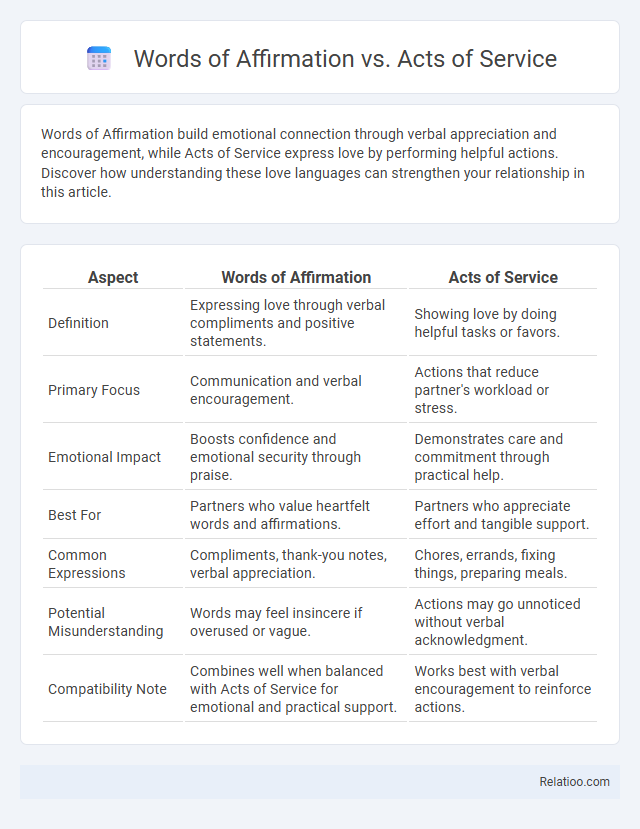Words of Affirmation build emotional connection through verbal appreciation and encouragement, while Acts of Service express love by performing helpful actions. Discover how understanding these love languages can strengthen your relationship in this article.
Table of Comparison
| Aspect | Words of Affirmation | Acts of Service |
|---|---|---|
| Definition | Expressing love through verbal compliments and positive statements. | Showing love by doing helpful tasks or favors. |
| Primary Focus | Communication and verbal encouragement. | Actions that reduce partner's workload or stress. |
| Emotional Impact | Boosts confidence and emotional security through praise. | Demonstrates care and commitment through practical help. |
| Best For | Partners who value heartfelt words and affirmations. | Partners who appreciate effort and tangible support. |
| Common Expressions | Compliments, thank-you notes, verbal appreciation. | Chores, errands, fixing things, preparing meals. |
| Potential Misunderstanding | Words may feel insincere if overused or vague. | Actions may go unnoticed without verbal acknowledgment. |
| Compatibility Note | Combines well when balanced with Acts of Service for emotional and practical support. | Works best with verbal encouragement to reinforce actions. |
Understanding Love Languages: Words of Affirmation vs Acts of Service
Understanding love languages involves recognizing how individuals express and receive affection differently, with Words of Affirmation emphasizing verbal encouragement and praise, while Acts of Service focus on actions like helping and supporting. Words of Affirmation include compliments, kind words, and appreciation that boost emotional connection, whereas Acts of Service demonstrate care through practical help and tangible efforts. Effective communication in relationships depends on identifying whether a partner values spoken affirmations or meaningful deeds as their primary love language.
Defining Words of Affirmation
Words of Affirmation, one of the five love languages, involves expressing love through verbal compliments, praise, and appreciation, reinforcing emotional connection and self-worth. This love language contrasts with Acts of Service, which communicates affection through helpful actions rather than spoken words. Understanding Words of Affirmation helps individuals recognize the power of positive verbal communication in building and maintaining intimate relationships.
What Are Acts of Service?
Acts of Service as a love language involve expressing care and affection through helpful actions such as cooking, cleaning, or running errands to ease a partner's burden. This love language is characterized by tangible demonstrations of support, where doing something meaningful conveys love more powerfully than words alone. Understanding Acts of Service helps individuals recognize and appreciate the practical ways their partner shows commitment and devotion.
Psychological Impact: How Each Love Language Influences Relationships
Words of Affirmation enhance self-esteem and emotional security through verbal appreciation, fostering trust and openness in relationships. Acts of Service demonstrate commitment and care by alleviating burdens, promoting cooperation and reducing stress. Each love language uniquely shapes emotional bonding, communication patterns, and conflict resolution, influencing overall relationship satisfaction.
Signs You Value Words of Affirmation
Signs you value words of affirmation include finding motivation and reassurance in verbal praise, feeling deeply appreciated when someone offers heartfelt compliments, and often remembering positive feedback or encouraging statements that uplift your spirit. You prioritize meaningful communication and emotionally resonate with expressions of love and support through spoken or written words. Your love language thrives on affirming conversations that validate your worth and strengthen your relationships.
Indicators You Prefer Acts of Service
Indicators you prefer Acts of Service as your love language include feeling most valued when others help with tasks or take initiative to ease your responsibilities. You often express love by doing helpful actions rather than through verbal praise or physical touch. Acts such as completing chores, running errands, or fixing things convey deeper affection to you than words alone.
Common Misunderstandings Between the Two Love Languages
Words of Affirmation and Acts of Service are distinct love languages often misunderstood as interchangeable expressions of love. You might misinterpret a partner's offer to help with chores as simply wanting praise, overlooking that Acts of Service reflect a deeper commitment to easing your burden. Confusing verbal praise with tangible actions can lead to unmet emotional needs, as each love language communicates love uniquely.
Effective Communication for Mixed-Love-Language Couples
Effective communication in mixed-love-language couples requires understanding that Words of Affirmation involve verbal expressions of love, while Acts of Service emphasize actions demonstrating care. Recognizing these differences allows partners to express affection in ways that resonate deeply with each other, fostering emotional connection. Tailoring communication to include both meaningful words and thoughtful actions bridges gaps, enhancing relationship satisfaction and mutual understanding.
Practical Examples: Expressing Love Through Words vs Actions
Words of Affirmation include verbal expressions such as compliments, encouragement, and heartfelt praise that directly communicate love and appreciation. Acts of Service involve tangible actions like cooking a meal, handling chores, or running errands to demonstrate care and support without speaking. Expressing love through words targets emotional reassurance and connection, while acts of service emphasize practical, visible efforts that alleviate burdens and show commitment.
Choosing the Right Approach: Tailoring Affection to Your Partner
Choosing the right love language between Words of Affirmation and Acts of Service involves understanding your partner's primary emotional needs and communication style. Words of Affirmation resonate with those who find encouragement and love through verbal praise and sincere compliments, while Acts of Service appeal to individuals who feel valued when actions reflect care and support in daily tasks. Tailoring your expressions of affection to match your partner's preferred love language enhances emotional intimacy and strengthens the relationship bond.

Infographic: Words of Affirmation vs Acts of Service
 relatioo.com
relatioo.com